Question Number 81564 by jagoll last updated on 14/Feb/20
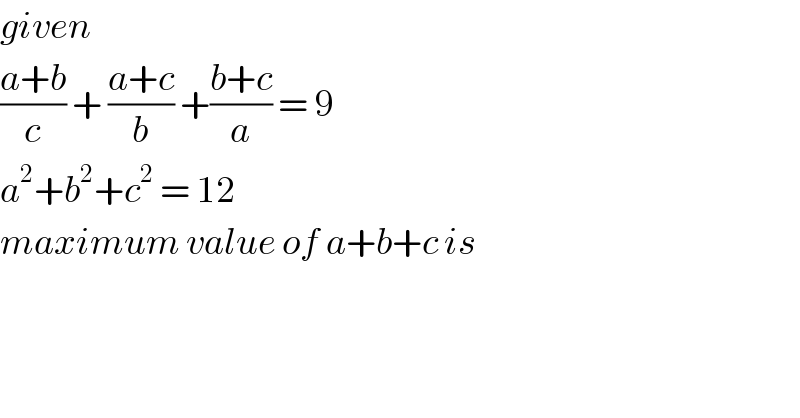
$${given}\: \\ $$$$\frac{{a}+{b}}{{c}}\:+\:\frac{{a}+{c}}{{b}}\:+\frac{{b}+{c}}{{a}}\:=\:\mathrm{9} \\ $$$${a}^{\mathrm{2}} +{b}^{\mathrm{2}} +{c}^{\mathrm{2}} \:=\:\mathrm{12}\: \\ $$$${maximum}\:{value}\:{of}\:{a}+{b}+{c}\:{is} \\ $$
Commented by mr W last updated on 14/Feb/20

$${a}+{b}+{c}\leqslant\mathrm{6}\sqrt{\mathrm{3}}\:? \\ $$
Commented by john santu last updated on 14/Feb/20
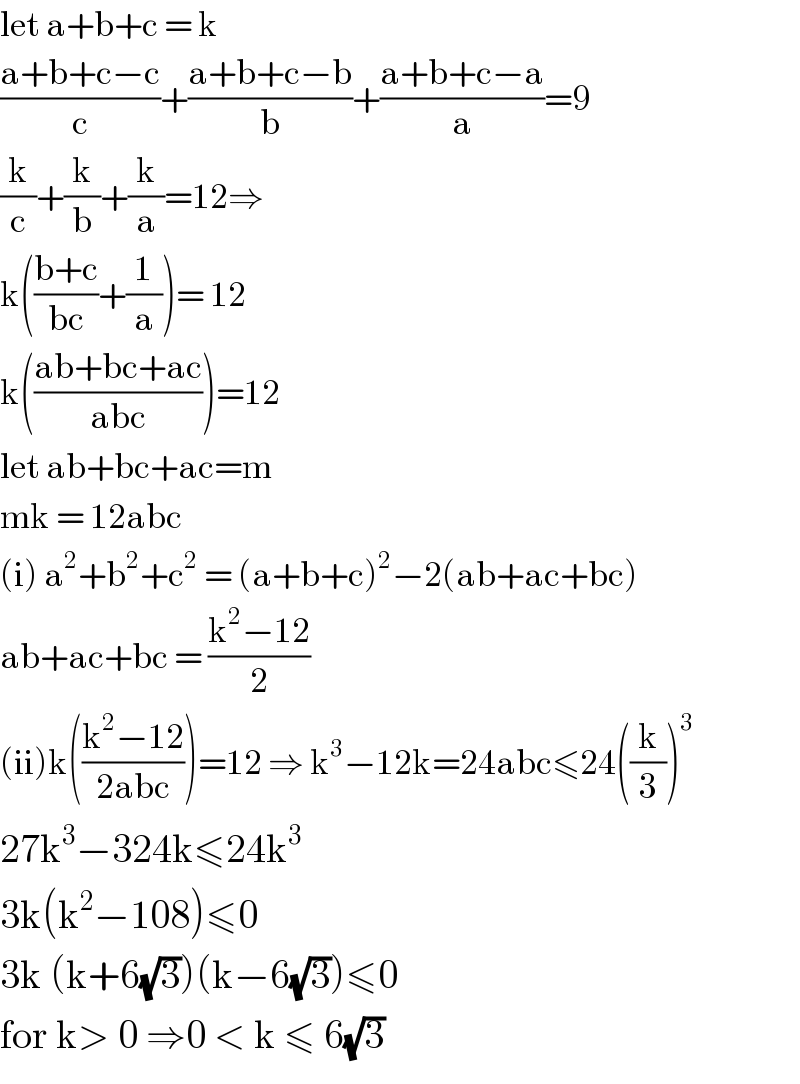
$$\mathrm{let}\:\mathrm{a}+\mathrm{b}+\mathrm{c}\:=\:\mathrm{k} \\ $$$$\frac{\mathrm{a}+\mathrm{b}+\mathrm{c}−\mathrm{c}}{\mathrm{c}}+\frac{\mathrm{a}+\mathrm{b}+\mathrm{c}−\mathrm{b}}{\mathrm{b}}+\frac{\mathrm{a}+\mathrm{b}+\mathrm{c}−\mathrm{a}}{\mathrm{a}}=\mathrm{9} \\ $$$$\frac{\mathrm{k}}{\mathrm{c}}+\frac{\mathrm{k}}{\mathrm{b}}+\frac{\mathrm{k}}{\mathrm{a}}=\mathrm{12}\Rightarrow\: \\ $$$$\mathrm{k}\left(\frac{\mathrm{b}+\mathrm{c}}{\mathrm{bc}}+\frac{\mathrm{1}}{\mathrm{a}}\right)=\:\mathrm{12} \\ $$$$\mathrm{k}\left(\frac{\mathrm{ab}+\mathrm{bc}+\mathrm{ac}}{\mathrm{abc}}\right)=\mathrm{12} \\ $$$$\mathrm{let}\:\mathrm{ab}+\mathrm{bc}+\mathrm{ac}=\mathrm{m} \\ $$$$\mathrm{mk}\:=\:\mathrm{12abc} \\ $$$$\left(\mathrm{i}\right)\:\mathrm{a}^{\mathrm{2}} +\mathrm{b}^{\mathrm{2}} +\mathrm{c}^{\mathrm{2}} \:=\:\left(\mathrm{a}+\mathrm{b}+\mathrm{c}\right)^{\mathrm{2}} −\mathrm{2}\left(\mathrm{ab}+\mathrm{ac}+\mathrm{bc}\right) \\ $$$$\mathrm{ab}+\mathrm{ac}+\mathrm{bc}\:=\:\frac{\mathrm{k}^{\mathrm{2}} −\mathrm{12}}{\mathrm{2}} \\ $$$$\left(\mathrm{ii}\right)\mathrm{k}\left(\frac{\mathrm{k}^{\mathrm{2}} −\mathrm{12}}{\mathrm{2abc}}\right)=\mathrm{12}\:\Rightarrow\:\mathrm{k}^{\mathrm{3}} −\mathrm{12k}=\mathrm{24abc}\leqslant\mathrm{24}\left(\frac{\mathrm{k}}{\mathrm{3}}\right)^{\mathrm{3}} \\ $$$$\mathrm{27k}^{\mathrm{3}} −\mathrm{324k}\leqslant\mathrm{24k}^{\mathrm{3}} \\ $$$$\mathrm{3k}\left(\mathrm{k}^{\mathrm{2}} −\mathrm{108}\right)\leqslant\mathrm{0}\: \\ $$$$\mathrm{3k}\:\left(\mathrm{k}+\mathrm{6}\sqrt{\mathrm{3}}\right)\left(\mathrm{k}−\mathrm{6}\sqrt{\mathrm{3}}\right)\leqslant\mathrm{0} \\ $$$$\mathrm{for}\:\mathrm{k}>\:\mathrm{0}\:\Rightarrow\mathrm{0}\:<\:\mathrm{k}\:\leqslant\:\mathrm{6}\sqrt{\mathrm{3}}\: \\ $$
Commented by mr W last updated on 14/Feb/20
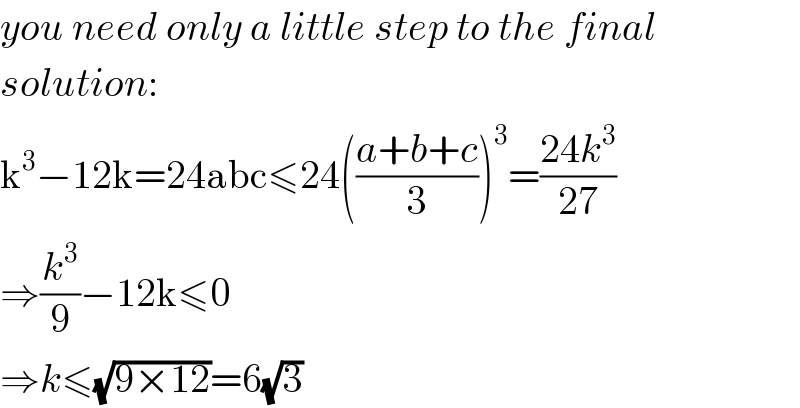
$${you}\:{need}\:{only}\:{a}\:{little}\:{step}\:{to}\:{the}\:{final} \\ $$$${solution}: \\ $$$$\mathrm{k}^{\mathrm{3}} −\mathrm{12k}=\mathrm{24abc}\leqslant\mathrm{24}\left(\frac{{a}+{b}+{c}}{\mathrm{3}}\right)^{\mathrm{3}} =\frac{\mathrm{24}{k}^{\mathrm{3}} }{\mathrm{27}} \\ $$$$\Rightarrow\frac{{k}^{\mathrm{3}} }{\mathrm{9}}−\mathrm{12k}\leqslant\mathrm{0} \\ $$$$\Rightarrow{k}\leqslant\sqrt{\mathrm{9}×\mathrm{12}}=\mathrm{6}\sqrt{\mathrm{3}} \\ $$
Commented by mr W last updated on 14/Feb/20

$${please}\:{discuss}: \\ $$$${can}\:{a}+{b}+{c}\:{reach}\:{this}\:{maximum}\:\mathrm{6}\sqrt{\mathrm{3}}? \\ $$$${i}\:{mean},\:{is}\:{a}+{b}+{c}<\mathrm{6}\sqrt{\mathrm{3}}\:{or} \\ $$$${a}+{b}+{c}\leqslant\mathrm{6}\sqrt{\mathrm{3}}\:{correct}? \\ $$
Commented by john santu last updated on 14/Feb/20

$$\mathrm{we}\:\mathrm{use}\:\mathrm{AM}\:\mathrm{sir}?\:\mathrm{yes}\:\mathrm{i}\:\mathrm{agree}\:\mathrm{with}\:\mathrm{you} \\ $$
Commented by mr W last updated on 14/Feb/20
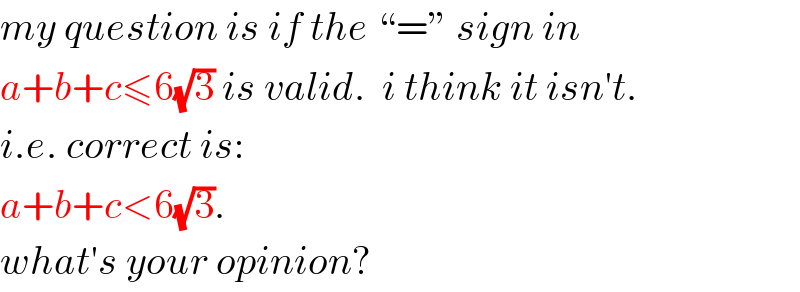
$${my}\:{question}\:{is}\:{if}\:{the}\:“=''\:{sign}\:{in} \\ $$$${a}+{b}+{c}\leqslant\mathrm{6}\sqrt{\mathrm{3}}\:{is}\:{valid}.\:\:{i}\:{think}\:{it}\:{isn}'{t}. \\ $$$${i}.{e}.\:{correct}\:{is}: \\ $$$${a}+{b}+{c}<\mathrm{6}\sqrt{\mathrm{3}}. \\ $$$${what}'{s}\:{your}\:{opinion}? \\ $$
Commented by jagoll last updated on 14/Feb/20

$${i}\:{not}\:{find}\:{this}\:{solution}\:{sir}. \\ $$
Commented by mr W last updated on 14/Feb/20

$${you}\:{mean}\:{this}\:{solution}\:{is}\:{wrong}\:{or} \\ $$$${you}\:{mean}\:{you}\:{don}'{t}\:{know}\:{the}\:{correct} \\ $$$${solution}? \\ $$
Commented by jagoll last updated on 14/Feb/20

$${i}\:{think}\:{this}\:{solution}\:{is}\:{correct}. \\ $$$${but}\:{i}\:{don}'{t}\:{know}\:{the}\:{solution}\:{does} \\ $$$${it}\:{match}\:{in}\:{the}\:{book}?\:{answer} \\ $$$${in}\:{the}\:{book}\:{were}\:{not}\:{included} \\ $$
Commented by mr W last updated on 14/Feb/20
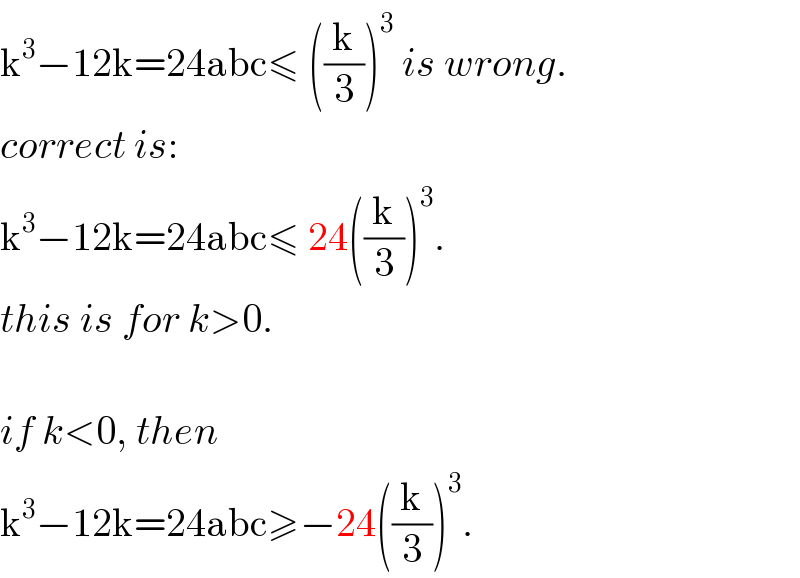
$$\mathrm{k}^{\mathrm{3}} −\mathrm{12k}=\mathrm{24abc}\leqslant\:\left(\frac{\mathrm{k}}{\mathrm{3}}\right)^{\mathrm{3}} \:{is}\:{wrong}. \\ $$$${correct}\:{is}: \\ $$$$\mathrm{k}^{\mathrm{3}} −\mathrm{12k}=\mathrm{24abc}\leqslant\:\mathrm{24}\left(\frac{\mathrm{k}}{\mathrm{3}}\right)^{\mathrm{3}} . \\ $$$${this}\:{is}\:{for}\:{k}>\mathrm{0}. \\ $$$$ \\ $$$${if}\:{k}<\mathrm{0},\:{then} \\ $$$$\mathrm{k}^{\mathrm{3}} −\mathrm{12k}=\mathrm{24abc}\geqslant−\mathrm{24}\left(\frac{\mathrm{k}}{\mathrm{3}}\right)^{\mathrm{3}} . \\ $$
Commented by john santu last updated on 14/Feb/20

$$\mathrm{oo}\:\mathrm{yes}\:\mathrm{it}\:\mathrm{my}\:\mathrm{typo} \\ $$
